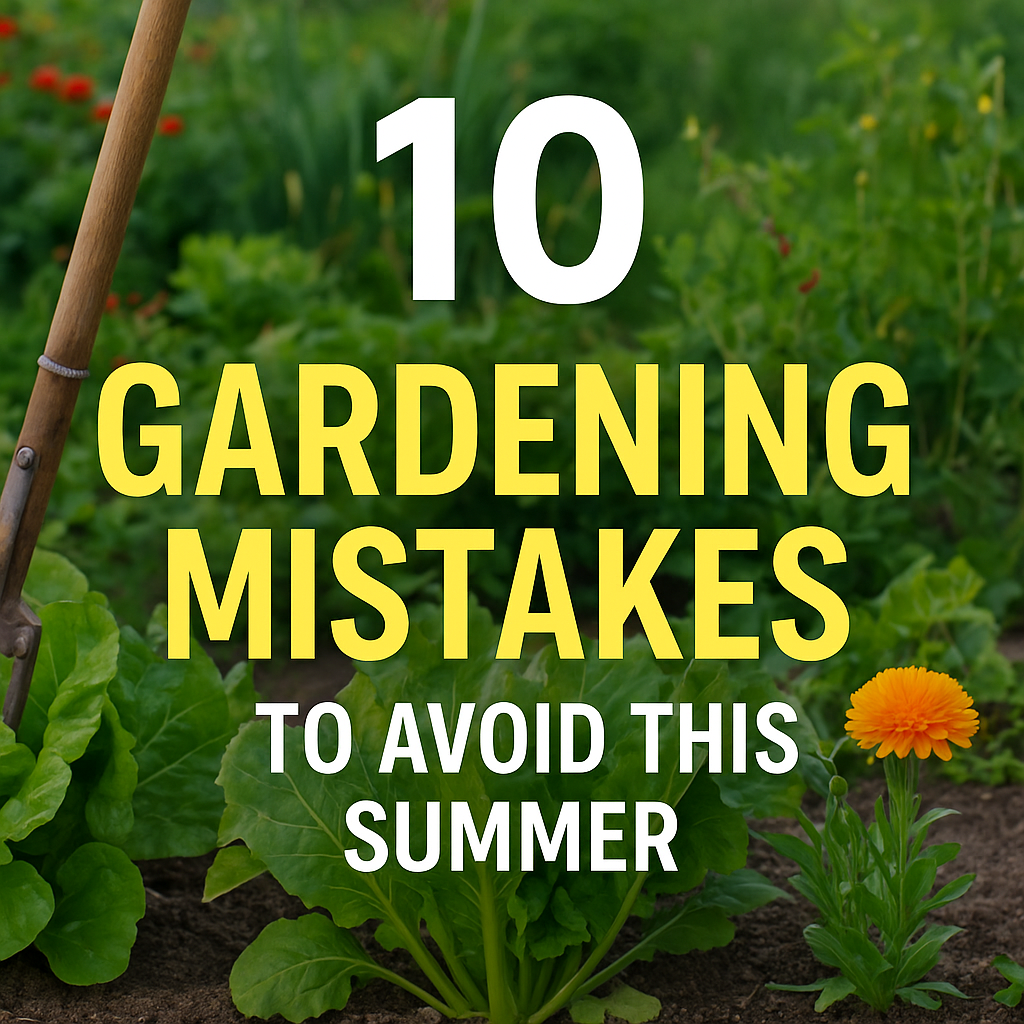A summer garden can be one of life’s greatest pleasures — bursting with color, fresh produce, and the satisfaction of growing something yourself.
But even experienced gardeners make mistakes that can lead to disappointing results.
Here are 10 of the most common gardening missteps and how you can avoid them this season.
1. Planting at the Wrong Time
Timing is everything in gardening. Planting too early can expose your crops to late frosts, while planting too late may shorten their growing season.
Tip: Check your local frost dates and use a planting calendar tailored to your region.
2. Overcrowding Your Plants
It’s tempting to plant as much as possible in a small space, but overcrowding leads to competition for sunlight, water, and nutrients.
Tip: Follow the spacing recommendations on seed packets or plant tags for healthier, more productive plants.
3. Ignoring Soil Health
Healthy soil is the foundation of a thriving garden. Neglecting soil quality can stunt growth and reduce yields.
Tip: Test your soil once a year and amend it with compost, manure, or organic matter as needed.
4. Overwatering or Underwatering
Too much water can cause root rot, while too little can stress or kill your plants.
Tip: Learn the moisture needs of each plant, and use mulch to help maintain consistent soil moisture.
5. Skipping Mulch
Mulch does more than look nice — it locks in moisture, keeps weeds down, and protects roots from extreme heat.
Tip: Apply a 2–3 inch layer of organic mulch around your plants, keeping it a few inches away from the stems.
6. Not Rotating Crops
Planting the same crop in the same spot year after year can deplete soil nutrients and encourage pests.
Tip: Rotate crops each season to keep your soil balanced and reduce the risk of disease.
7. Neglecting Pest Prevention
Pests can take over quickly if left unchecked. Waiting until you see damage often means it’s too late.
Tip: Inspect your garden regularly and use natural pest deterrents before problems escalate.
8. Using Dull Tools
Working with dull shears or hoes makes gardening harder and can damage plants.
Tip: Sharpen your tools at the start of each season and clean them after use to prevent rust.
9. Forgetting to Prune
Some plants need pruning to produce more fruit or maintain their shape. Skipping this step can lead to tangled, unproductive growth.
Tip: Learn the pruning schedule for each type of plant in your garden.
10. Ignoring Sunlight Requirements
Every plant has different sunlight needs. Planting sun-lovers in shady spots (or vice versa) leads to poor growth.
Tip: Observe your garden’s sunlight patterns and choose plants suited to each area.
Now, Why Would You Bury Bananas In Your Garden?
Burying bananas (or just banana peels) in your garden is an old-school gardener’s trick — and it can actually be quite useful if done right.
Here’s why people do it and what you get out of it:
1. Slow-release potassium boost
- Bananas are loaded with potassium (K), which is crucial for flowering, fruiting, and overall plant health.
- As the banana decomposes, it releases potassium slowly into the soil, helping plants develop stronger stems, better disease resistance, and more vibrant blooms.
2. Added phosphorus for roots & flowers
- Banana peels also contain phosphorus (P), which supports root development and improves flowering and fruit set.
3. Organic matter for soil health
- Burying them adds organic material to the soil as they break down, improving texture, aeration, and moisture retention.
4. Microbial activity boost
- Decomposing fruit attracts beneficial microbes and earthworms — both of which improve nutrient cycling and soil structure.
5. Waste reduction
- It’s an easy way to recycle kitchen waste into plant food instead of tossing it.
Final Thoughts
Avoiding these common mistakes can make your summer gardening more rewarding and productive.
With a little planning, consistent care, and attention to detail, you’ll be enjoying beautiful blooms and delicious homegrown produce in no time.
